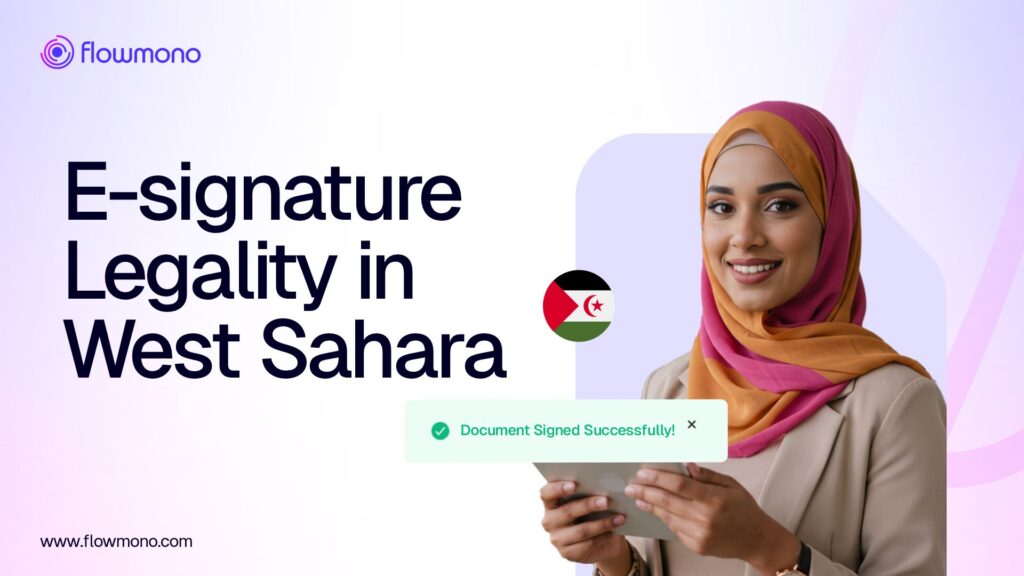
Due to its disputed political status, the legality of electronic signatures in Western Sahara is not governed by a separate, specific legal framework. Instead, the laws that apply depend on the administrative control of the territory. The majority of Western Sahara is administered by Morocco, which means Moroccan law concerning e-signatures is the de facto legal standard in those areas. The Polisario Front, which governs the remaining parts, does not have a comprehensive, publicly available legal framework on this topic. Therefore, this article will focus on the legal situation as it applies under Moroccan law.
Overview and Legal Framework
The legal foundation for electronic signatures in Moroccan-administered Western Sahara is built on Law No. 53-05 on the Electronic Exchange of Legal Data. Enacted in 2007, this law provides a clear framework for the use of digital documents and signatures, granting them the same legal weight as their paper counterparts. It operates on the principle of legal recognition, ensuring that an electronic signature is not denied legal effect or admissibility simply because it is in an electronic form.
The law distinguishes between different types of electronic signatures, similar to international standards like the EU’s eIDAS regulation, with varying levels of legal weight and security:
1. Simple Electronic Signature (SES): This is the most basic form, such as a scanned image or a typed name. While legally recognized, it has the lowest level of reliability.
2. Advanced Electronic Signature (AES): This type of signature is uniquely linked to the signatory and is capable of identifying them. It is created using data that the signatory can, with a high degree of confidence, use under their sole control.
3. Qualified Electronic Signature (QES): The QES is the gold standard, enjoying the highest legal standing. It is created by a secure signature creation device and is based on a qualified certificate issued by a trusted Certification Service Provider (CSP). A QES has the equivalent legal effect of a handwritten signature and is legally presumed to be valid.
The National Telecommunications Regulatory Agency (ANRT) in Morocco is the body responsible for accrediting these CSPs, ensuring a secure and reliable infrastructure for digital transactions.
Documents That Can Be Signed Electronically
Under Moroccan law, which applies to the Moroccan-controlled areas of Western Sahara, a broad range of documents can be legally signed using electronic signatures. This is a key step in facilitating modern business practices and digital government services. These documents include:
1. Commercial and Civil Contracts: This encompasses most general business agreements, such as sales contracts, service level agreements, and non-disclosure agreements.
2. Employment Contracts: The hiring process, including offers and formal employment agreements, can be conducted electronically.
3. Financial Documents: Many banking and financial forms, including loan agreements and account opening documents, are valid when signed electronically.
4. Government Forms: The push for e-government services in Morocco means many public sector applications and declarations can be submitted with an electronic signature.
5. Internal Business Documents: HR policies, internal approvals, and other corporate documents can be signed electronically, streamlining internal processes.
The flexibility of the law allows businesses and individuals to adopt digital workflows for most of their transactional needs, promoting efficiency and reducing reliance on physical paper.
Documents That Cannot Be Signed Electronically
While the scope for electronic signatures is wide, Moroccan law specifies certain documents that must still be executed with a traditional, handwritten signature or through specific notarial procedures. These exceptions are in place to ensure a high level of legal certainty and to protect against fraud, especially in matters of significant legal consequence. Documents that generally cannot be signed electronically include:
A. Real Estate Deeds: Transactions related to the sale, purchase, or transfer of real property, which require notarization and registration, must be signed in person with a wet-ink signature.
B. Wills and Testamentary Documents: The legal formalities required for a will to be valid, often including the presence of witnesses and a physical signature, cannot be met with an electronic signature.
C. Family Law Documents: Certain documents concerning family matters, such as marriage contracts and divorce decrees, require traditional, formal signatures.
D. Notarial Deeds: Documents that require a notary public to certify their authenticity and the identity of the signatory typically fall outside the scope of e-signatures.
E. Powers of Attorney: Certain powers of attorney, especially those for major transactions, may require notarization and a physical signature.
These restrictions are common in legal systems worldwide and are designed to safeguard the integrity of documents with profound and irreversible legal effects.
Notable Changes in the Laws and References
The primary legal framework for e-signatures in the region has remained relatively stable since the enactment of Law No. 53-05. However, there have been some key developments:
1. Law No. 43.20 on Trust Services for Electronic Transactions: While not a direct change to the legality of e-signatures, this law, passed in 2020, modernized the framework for trust services, including electronic seals and time stamping. This strengthens the security and reliability of all electronic transactions, including those using electronic signatures, by creating a more robust ecosystem.
2. Digital Transformation Initiatives: Morocco has launched various digital transformation strategies, such as the “Maroc Numeric” plans and the “Digital Morocco 2030” strategy. These initiatives aim to digitize public services and create a favourable environment for the digital economy, indirectly reinforcing the importance and use of electronic signatures.
The ongoing political situation in Western Sahara means that the application of these laws is tied to the administrative authority on the ground. For businesses operating in the region, the most prudent approach is to adhere to the Moroccan legal framework.
References
- Moroccan Law No. 53-05 on the Electronic Exchange of Legal Data (2007).
- Moroccan Law No. 43.20 on Trust Services for Electronic Transactions (2020).
- Latham & Watkins LLP, “Understanding the Enforceability and Admissibility of Electronic Signatures in Saudi Arabia’s Evolving Legal System.”
- Flowmono Blog: “E-signature Legality in Morocco.” This article offers a clear, summary-level overview of the applicable laws.
![]()